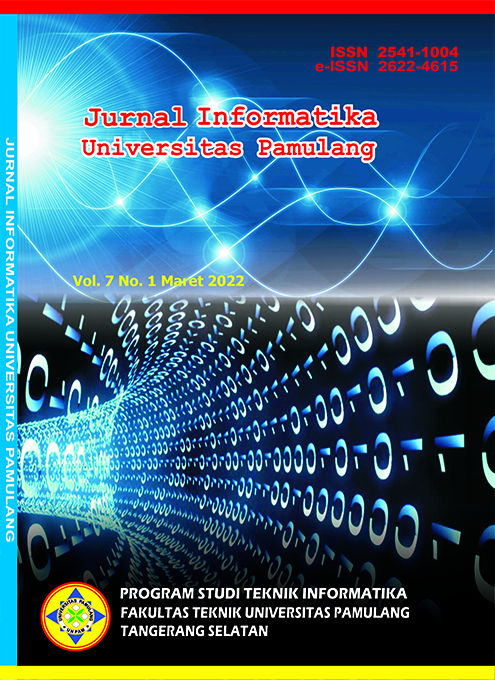Penerapan Algoritma Apriori Pada Prediksi Penjualan Tanaman Hias Bromelia (Studi Kasus: Karimah Flora)
DOI:
https://doi.org/10.32493/informatika.v7i1.16135Keywords:
Apriori Algorithm, Prediction, Decorative Plants, BromeliaAbstract
Apriori algorithms are part of the algorithms in data mining which are often used to find data patterns. Apriori algorithms are often used in sales transaction data. In this study, the authors discussed the application of apriori to the prediction of sales of ornamental bromeliads. The author found that one of the problems is often taking care of plants. Of course this reduces the revenue at the Karimah Flora shop. From these problems the authors conducted research on sales transaction data in the last 3 months of 2020, namely August, September and October. Then the authors collect data on the sale of ornamental plants bromeliads which will then be calculated by applying the a priori algorithm formula. The calculation determines which of the 21 types of ornamental plants bromeliads will be studied, after which the authors conduct an analysis for order combination patterns of up to 4-itemsets, so that they can form an association rule. By applying the algorithm in this study, it produces a combination of ornamental bromeliads to attract consumers to buy promotional packages offered according to the pattern.References
Buulo, E. (2020). Data Mining untuk Perguruan Tinggi. DI Yogyakarta: Deepublish.
Evinola. (2019). Mengenal Ruang Lingkup Tanaman Hias. Jawa Timur: Uwais Inspirasi Indonesia.
Kurniawati, L., Kusuma, A. E., & Dewansyah, B. (2019). Implementasi Algotima Apriori untuk Menentukan Persediaan Spare Part Compressor. Journal of Computer Engineering System and Science, IV(1), 6-10.
Pahlevi, O., Sugandi, A., & Sintawati, I. D. (2018). Penerapan Algoritma Apriori dalam Pengendalian Kualitas Produk. Sinkron, III(1), 272-278.
Panjaitan, S., Sulindawaty, Amin, M., Lindawati, S., Watrianthos, R., Sihotang, H. T., & Sinaga, B. (2019). Implementation of Apriori Algorithm for Analysis of Consumer Purchase Patterns. The International Conference on Computer Science and Applied Mathematic, 1-9.
Putra, J. L., Raharjo, M., Sandi, T. A., Ridwan, & Prasetyo, R. (2019). Implementasi Algoritma Apriori Terhadap Data Penjualan pada Perusahaan Retail. Jurnal PILAR Nusa Mandiri, XV(1), 85-90.
Sherly. (2020). Bromelia, Tanaman Hias Tak Manja. Jakarta: Bhuana Ilmu Populer.
Sianturi, F. A. (2018). Penerapan Algoritma Apriori untuk Penentuan Tingkat Pesanan. Jurnal Mantik Penusa, II(1), 50-57.
Simbolon, P. H. (2019). Implementasi Data Mining Pada Sistem Persediaan Barang Menggunakan Algoritma Apriori (Studi Kasus: Srikandi Cash Credit Elektronik dan Furniture). Jurnal Riset Komputer (JURIKOM), VI(4), 402.
Yendrizal. (2020). Data Mining Penjualan Tanaman Hias dengan Algoritma Apriori pada Toko Flores Elishabet. Jurnal Media Informatika Budidarma, IV(2), 472-478.
Downloads
Published
Issue
Section
License
Authors who publish with this journal agree to the following terms:
- Authors retain copyright and grant the journal right of first publication with the work simultaneously licensed under a Creative Commons Attribution-NonCommercial 4.0 International (CC BY-NC 4.0) that allows others to share the work with an acknowledgement of the work's authorship and initial publication in this journal.
- Authors are able to enter into separate, additional contractual arrangements for the non-exclusive distribution of the journal's published version of the work (e.g., post it to an institutional repository or publish it in a book), with an acknowledgement of its initial publication in this journal.
- Authors are permitted and encouraged to post their work online (e.g., in institutional repositories or on their website) prior to and during the submission process, as it can lead to productive exchanges, as well as earlier and greater citation of published work (See The Effect of Open Access).
Jurnal Informatika Universitas Pamulang have CC-BY-NC or an equivalent license as the optimal license for the publication, distribution, use, and reuse of scholarly work.
In developing strategy and setting priorities, Jurnal Informatika Universitas Pamulang recognize that free access is better than priced access, libre access is better than free access, and libre under CC-BY-NC or the equivalent is better than libre under more restrictive open licenses. We should achieve what we can when we can. We should not delay achieving free in order to achieve libre, and we should not stop with free when we can achieve libre.
Jurnal Informatika Universitas Pamulang is licensed under a Creative Commons Attribution-NonCommercial 4.0 International (CC BY-NC 4.0)
YOU ARE FREE TO:
- Share : copy and redistribute the material in any medium or format
- Adapt : remix, transform, and build upon the material for any purpose, even commercially.
- The licensor cannot revoke these freedoms as long as you follow the license terms





